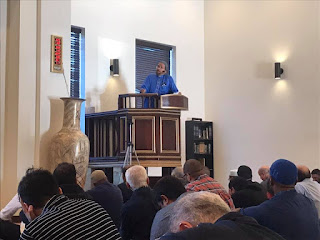( Note: The following is an edited version of khutbah delivered 6/16/23 at Masjid Ibrahim of Las Vegas, Nevada. Please note that the opening Hamd (expressions of praise for God) have been omitted, as well as the verbalization of peace for the Prophets. In addition, it has been formatted into one article, rather than the traditional two sections as found within a khutbah.)
The blessing of practical guidance
As Muslims, we have as our ultimate source of guidance and information the pure, uncorrupted words of Almighty Allah within the Qur'an, however, we also possess, as a second source of guidance and information, the example of the Messenger of Allah. This did not occur as an accident or an afterthought, rather, it is the system by which Allah has made the deen, in order to convey and preserve the message of the revelation. Thus, we read in the Qur'an "Verily, you have in the messenger of Allah a goodly model, for any who has hope in Allah, the final day, and reflect upon Allah abundantly." ( Q 33:21)
لَقَدۡ کَانَ لَکُمۡ فِیۡ رَسُوۡلِ اللّٰہِ اُسۡوَۃٌ حَسَنَۃٌ لِّمَنۡ کَانَ یَرۡجُوا اللّٰہَ وَالۡیَوۡمَ الۡاٰخِرَ وَذَکَرَ اللّٰہَ کَثِیۡرًا
We have within the Prophet's practical instructions a wealth of information on addressing negative emotions. He said: "Don't look at those above you, look at those below you." (Al-Bukhari & Muslim).
Allah certainly gives and restricts for whom he wills, in accordance with his plan and wisdom, these are things we are often unable to see, and as a result of our short vision, experience jealousy and the like.
By following the aforementioned hadeeth, it helps to remove the destructive feeling of jealousy. Envy is an emotion that invites a satanic presence, to the extent that it is discussed within the last two Quranic chapters (Al-Falaq and An-Naas).
Prophet Muhammad also sought to limit those items which arouse jealousy in others. He forbade men from wearing gold and silk (Ibn Maajah). Men are the traditional public figures, and thus by forbidding men from adoring with these two items, it limits public resentment, which can-if unchecked- translate into actual crimes and social disorder.
Our religion has also taught that when we see examples of God's blessings, we should say Maa-shaa-Allah (as God has willed) and Alhamdulillaah (praise belongs to Allah).
Allah gives according to his wisdom and plan, and recognition of this helps to remove envy from the hearts.
Anger
There are times when anger is not only appropriate, but also necessary. A man seeing his wife, daughter, children etc. under attack is supposed to become angry and take action to defend his family. Yet, as a general principle it is widely recognized that anger is a dangerous emotional outpouring.
The hadeeth literature reports that a man asked the Prophet for advice, and he responds (3 times)
Do not give in to the tendency to be angry "(the arabic text for this is Laa Taghdab) (Saheeh Muslim).
While the above sounds good, our Prophet went further. He practically stated that when angry while sitting, stand, when walking, run, go make wudoo (ablution), offer a two rak'ah (unit) prayer. (sunan Abu Dawud 7482, 7484).
In other words, removing oneself from the situation by taking these actions helps to de-escalate the matter before taking regrettable actions. This is very sound advice.
Emotional blackmail
The Prophet as a leader, as God's messenger, was nonetheless a human being. He and his followers had been victims of Makkan oppositon for years, and upon the liberation of Makkah, he issued a general amnesty, which benefitted the leaders of that opposition such as Abu Sufyan and Hind. The latter had ordered a slave named Wahshi to kill and mutilate the Prophet's beloved uncle Hamza (Radee Allahu 'anhu).
All three of these people became Muslim and recited the shahaadah (declaration of faith) with the Prophet. With Wahshi, the assassin, he told him that while he accepts his declaration, and he is under the amnesty promised by the new order he (The Prophet) established, he did not want to see him (Wahshi) again, because he gets reminded of his uncle!
So the Prophet, while still carrying on in his role, was a human being with human emotions. He guarded himself from negativity by telling Wahshi he didn't want to see him anymore.
The lesson is that taking actions of self-protection are perfectly valid. Naysayers and abusers often resort to emotional blackmail and manipulation of religious language to force their agendas; however, we learn from the Prophet that we are allowed to protect ourselves from such things.
(Most of our Friday prayer and Qur'an study sessions are livestreamed on our mosque Facebook page "The Masjid Ibrahim". In addition to this website, many of our talks are to be found on YouTube on various channels, such as "Arifin Library". For updates, do follow/subscribe to those sites)


